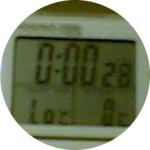

A simple definition of "efficiency", as offered by George Ritzer, is the "optimum means to a given end".
Efficiency has permeated consumer culture and is now a common attribute to look for in production of goods, in a labor force and in the food you deliver to your family. It has entered American society and affects most facets of everyday life from the form or transportation that one uses to go to work to the duties they perform. It is one of primary goals of neoclassical economic growth models and is ingrained in the free-market ideology, which is perpetuated by American society.
Efficiency can also be measured in many ways through energy use, cost, lowered environmental damage or in time. Our project looks at the way in which efficiency is connected to the irrationality of rationality as well as to consumer society as a whole. Beyond different types of efficiency there is also the commodification of the idea of efficiency. Through marketing foods and appliances are sold as more efficient in cost or time, allowing one to fit more into their daily life. Although the goods one purchases may seem to be efficient in one area--for example a T.V. dinner may only take 3 minutes to prepare--they may be poor in energy efficiency since they require precooking, packaging and processing. Efficiency is not always what it seems and it can be looked at as both a societal value with many merits and an overexploited marketing tool.